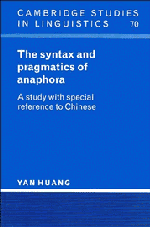Book contents
- Frontmatter
- Contents
- Preface
- Abbreviations used in glosses
- 1 A neo-Gricean pragmatic theory and anaphora
- PART I ANAPHORA IN GOVERNMENT AND BINDING THEORY
- 2 Empty categories
- 3 Control
- 4 Long-distance reflexivisation
- PART II THE PRAGMATICS OF ANAPHORA
- Notes
- References
- Index of names
- Index of languages
- Index of subjects
2 - Empty categories
Published online by Cambridge University Press: 23 October 2009
- Frontmatter
- Contents
- Preface
- Abbreviations used in glosses
- 1 A neo-Gricean pragmatic theory and anaphora
- PART I ANAPHORA IN GOVERNMENT AND BINDING THEORY
- 2 Empty categories
- 3 Control
- 4 Long-distance reflexivisation
- PART II THE PRAGMATICS OF ANAPHORA
- Notes
- References
- Index of names
- Index of languages
- Index of subjects
Summary
The discovery of empty categories and the principles that govern them and that determine the nature of mental representations and computations in general may be compared with the discovery of waves, particles, genes, valence, and so on and the principles that hold of them, in the physical sciences.
Chomsky (1988: 91)Introduction
Chinese is well known to be a language with widespread zero anaphora (Chao 1968, Lü 1980, 1986[1942], Wang 1985[1943], Gao 1986[1948]). Following Ross (1982), C.-T. J. Huang (1984) suggests that languages be classified in analogy with McLuhan's (1964) ‘hot-cool’ division of the media. Accordingly, there are three types of language in relation to the explicitness with which they encode anaphoric relations: ‘hot’, ‘medium’ and ‘cool’. Chinese is characterised as a very ‘cool’ language in that it allows the massive use of zero anaphora and the interpretation of anaphoric expressions in Chinese relies heavily on inference, context and world knowledge. A similar typological classification can also be found in Gundel (1980), in which Chinese is considered to be a language that allows great freedom for the occurrence of zero anaphora. Furthermore, zero anaphors frequently take precedence over pronouns at both sentence and discourse levels in Chinese, which leads Li & Thompson (1979, 1981) and C. N. Li (1992: 260) to the observation that zero anaphora ‘should be considered the norm in Chinese discourse’.
Within GB theory – a parametric theory of UG – zero anaphors are treated as empty categories (ECs), entities that are assumed to be phonologically null but syntactically present.
Information
- Type
- Chapter
- Information
- The Syntax and Pragmatics of AnaphoraA Study with Special Reference to Chinese, pp. 21 - 57Publisher: Cambridge University PressPrint publication year: 1994
